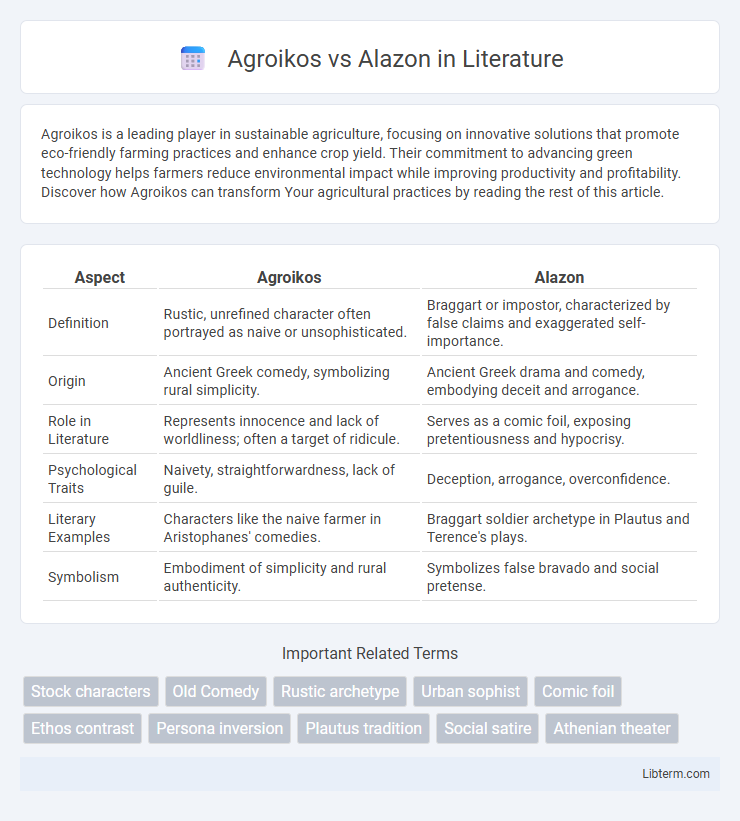Agroikos is a leading player in sustainable agriculture, focusing on innovative solutions that promote eco-friendly farming practices and enhance crop yield. Their commitment to advancing green technology helps farmers reduce environmental impact while improving productivity and profitability. Discover how Agroikos can transform Your agricultural practices by reading the rest of this article.
Table of Comparison
| Aspect | Agroikos | Alazon |
|---|---|---|
| Definition | Rustic, unrefined character often portrayed as naive or unsophisticated. | Braggart or impostor, characterized by false claims and exaggerated self-importance. |
| Origin | Ancient Greek comedy, symbolizing rural simplicity. | Ancient Greek drama and comedy, embodying deceit and arrogance. |
| Role in Literature | Represents innocence and lack of worldliness; often a target of ridicule. | Serves as a comic foil, exposing pretentiousness and hypocrisy. |
| Psychological Traits | Naivety, straightforwardness, lack of guile. | Deception, arrogance, overconfidence. |
| Literary Examples | Characters like the naive farmer in Aristophanes' comedies. | Braggart soldier archetype in Plautus and Terence's plays. |
| Symbolism | Embodiment of simplicity and rural authenticity. | Symbolizes false bravado and social pretense. |
Introduction to Agroikos and Alazon
Agroikos and Alazon are two distinct character types found in ancient Greek comedy, representing contrasting social roles and personality traits. Agroikos characterizes the rustic, unsophisticated country bumpkin, often portrayed as naive and awkward in urban settings, symbolizing innocence but also social ineptitude. Alazon, by contrast, embodies the boastful impostor or braggart, typically exhibiting arrogance and deceit to mask insecurity, frequently acting as a comedic foil through exaggerated self-importance and pretentious behavior.
Historical Background of Both Characters
Agroikos and Alazon originate from ancient Greek theater, embodying contrasting character archetypes in classical comedy. Agroikos, representing the rustic and unsophisticated country bumpkin, often appears as a gullible and foolish figure exposed to the cunning. In contrast, Alazon is the braggart or impostor, a comedic character known for arrogance and boastful behavior, frequently deceiving others with inflated self-importance.
Classical Origins: Ancient Greek Comedy
Agroikos and Alazon are key stock characters from ancient Greek comedy, emblematic of contrasting social archetypes. Agroikos, derived from rural roots, personifies the unsophisticated, rustic fool, often at odds with urban wit and sophistication. Alazon represents the braggart or impostor, known for exaggeration and false confidence, shaping comedic conflict through deception and pretension in classical plays by Aristophanes and Menander.
Defining Traits of the Agroikos
The Agroikos embodies traits of rustic simplicity, social awkwardness, and a lack of urban sophistication, often portrayed as unsophisticated peasants or country folk in Greek comedy. Defined by their unrefined manners, naivety, and exaggerated shyness, Agroikoi contrast sharply with the more cunning and boastful Alazon characters who feign knowledge and status. These defining traits highlight the Agroikos as a symbol of natural innocence and authenticity within theatrical archetypes.
Key Characteristics of the Alazon
The Alazon is characterized by its boastful arrogance, often exaggerating personal achievements to impress others and mask insecurities. This figure frequently adopts a false persona, displaying overconfidence and self-deception while remaining oblivious to its own flaws. Unlike the honest and self-aware Agroikos, the Alazon's behavior embodies hubris and social pretension, leading to inevitable exposure and ridicule.
Agroikos vs Alazon: Symbolic Meanings
Agroikos symbolizes rustic ignorance and simplicity, embodying a naive, unsophisticated character often depicted as an uncultured peasant disconnected from urban manners. Alazon represents deception and self-delusion, typified by characters who exaggerate their abilities or status to mislead others. The contrast between Agroikos and Alazon highlights the difference between innocent naivety and deliberate falsehood in classical literature and theatrical archetypes.
Conflict and Interaction in Literature
Agroikos and Alazon represent contrasting stock characters in classical literature, embodying the conflict between the rustic, unsophisticated farmer (Agroikos) and the boastful, deceitful impostor (Alazon). Their interactions highlight themes of social deception, class tension, and the struggle between authenticity and pretense, often driving comedic plotlines in ancient Greek and Roman drama. This dynamic serves to critique societal norms by exposing the folly and vice hidden beneath polished appearances.
Notable Examples in Classic Works
Agroikos and Alazon represent contrasting character archetypes found in classical literature, with Agroikos embodying the rustic, unsophisticated farmer and Alazon depicted as the boastful, deceitful impostor. Notable examples include the character of Old Dorcon in Aristophanes' plays, who exemplifies the Agroikos figure with his straightforward, rural naivety. In contrast, Alazon is vividly portrayed in Menander's comedies, where characters like the braggart soldier or the cunning parasite manipulate social situations through exaggerated self-importance and deception.
Influence on Modern Storytelling
Agroikos and Alazon, archetypes rooted in ancient Greek comedy, maintain a significant influence on modern storytelling by shaping character development and narrative structure. Agroikos, the rustic fool, embodies naive straightforwardness that contrasts with urban sophistication, fueling comedic tension and social commentary. Alazon, the boastful impostor, serves as a timeless figure of deception and hubris, often driving plot conflicts and highlighting themes of pride and folly in contemporary literature and media.
Conclusion: Lasting Impact on Character Archetypes
Agroikos and Alazon represent contrasting archetypes that have profoundly influenced literature and theater, with Agroikos embodying the rustic, foolish peasant and Alazon depicting the braggart impostor. Their lasting impact is evident in how these characters shape modern comedic roles and social satire, reinforcing stereotypes that critique human folly and pretension. The enduring presence of Agroikos and Alazon underscores their importance in character development and narrative structure within classical and contemporary storytelling.
Agroikos Infographic

 libterm.com
libterm.com